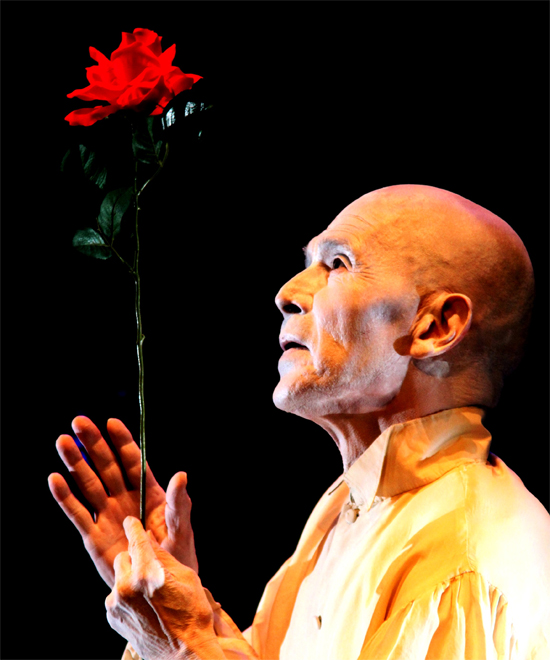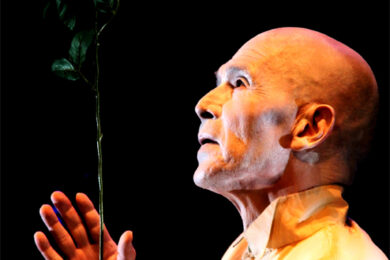When London’s Southbank Centre announced earlier this year that the 2012 edition of their annual artist-curated Meltdown Festival was to be helmed by none other than Antony Hegarty, there was a nod of collective appreciation in the Quietus office. Here was someone whose work over the past few years has engaged with issues of gender, sexuality, ecology and death with a depth that’s unusual for an artist with such broad-reaching appeal; an artist who straddles the underground and mainstream worlds better than almost anyone else they’ve chosen as curator. (Hegarty, after all, picked up the Mercury Prize in 2005 for his album I Am A Bird Now.)
We were even more impressed when the line-up was announced, and proved to be one of the most varied and thought-provoking that Meltdown had assembled in years. It included his own influences (Diamanda Galás, Marc Almond), previous collaborators (Lou Reed, David Tibet, Johanna Constantine) and a raft of contemporaries, from magickal British duo Cyclobe – former members of Coil – to Cocteau Twins’ Elizabeth Fraser, via Yoshito Ohno (pictured, top), Laurie Anderson, Wiliam Basinski and Matmos.
“I dreamed of assembling a constellation of courageous artists, all of whom have used their platforms as cultural producers to challenge us," said Hegarty, at the time, of his chosen line-up. "They have exhibited a ferocity in their pursuit of beauty, and, falling like a guillotine behind it, justice. Today I am among a group of artists from NYC (some of whom are performing at this Meltdown Festival) who reject patriarchy in its myriad virulent and apocalyptic manifestations, and who advocate for a fundamental shift towards the feminine in all our systems and structures of governance. We have named this approach Future Feminism."
We were excited and intrigued enough by what was on offer to decide to cover the festival pretty comprehensively this year, so we assembled a crack team of reviewers to take on the task. Along the way they encountered YouTube-hit musical dogs, secular seances, arse-spanking, Lulu, Boris Karloff, an orchestra attempting to mimic decaying tape, and the ‘Wall of Vagina’. To steal a conclusion from Quietus scribe Russell Cuzner: "With such variety and depth, delivered by an array of uncompromising and distinct artists, one begins to wish Antony would curate all year round – the world just might be a better place for it."
For our full account of the festival, read on. It’s an in-depth one, so pour yourself a brew and get comfortable.
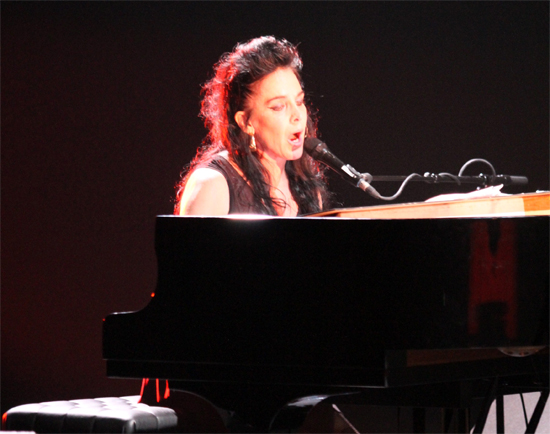
Diamanda Galás
Diamanda Galás
Royal Festival Hall, 1st August
As opening gambits for a twelve-day festival go, it’s an auspicious one: Diamanda Galás’ performance packs enough force to temporarily flatten her audience into a dazed submission that lasts long after she’s left the stage. That’s largely down to her voice – an otherworldly and mercurial thing, flexible enough to swiftly transform the mood of the room, often within the space of seconds. During ‘Man & Woman Go Through the Cancer Ward’, a deceptively quiet opening section gradually descends into a hell of abrasion, with Galás thrashing at her piano as though attempting to chase demonic inhabitants from inside its wooden body. As the song reaches its crescendo – loud enough to press in upon the eardrums – the tiny spotlight she’s sat within begins to strobe, lending her the awkward, jerky gait of a marionette.
It’s one of the few times the lighting matches the high drama of Galás’ performance. For most of her time on stage she sits side-on to the crowd, within a pool of moonlight that slowly waxes and wanes. She barely even acknowledges our presence until three songs into the set, but when she finally addresses the room it’s with her customary scathing wit; one heckler is swiftly put in his place with a stern "Do you know who you’re talking to?" There’s far more focus on the songs themselves, though: adaptations of older pieces in a variety of languages, taking her from Germany 1912 and Egypt 1923 to folk/blues standard ‘O Death’, via a couple of Jacques Brel songs along the way.
More than the songs themselves, though, it’s the sheer power of Galás performance that impresses the most. Combined with the low level of embellishment, the neural responses it provokes are less emotional than narcotic, reaching towards a continued peak of chemical intensity that’s strong enough to overpower the normal signifiers of passing time. She’s onstage for over 90 minutes, but by the time she finishes a brief encore and swiftly departs the stage, we could just as easily have been sat in the auditorium for half that time. RG
Laurie Anderson Presents ‘Dirtday!’
Royal Festival Hall, 3rd August
The Royal Festival Hall is bathed in warm blue light as we enter the auditorium tonight. It couldn’t be more different to its appearance during Diamanda Galás’ opening performance a couple of nights earlier. Where Galás hid in the shadows, tonight the entire stage floor is covered in a scattering of small candles. From a distance they appear as microscopic as tealights or fireflies, suggesting that the stage itself is a void, with everything on it floating in free space.
Laurie Anderson drifts through to reach a podium, set-up with a synthesiser and cut-away violin. The latter is used regularly over the course of the 90 minutes she’s onstage, periodically interrupting the show’s otherwise free-flowing and discursive monologue with elegiac musical vignettes. In the background electronic ambience swells and flickers around the edges of perception, occasionally erupting into spare, trip-hop-leaning beats and pulses of sub-bass that shake the venue’s seats.
Musically it offers nothing particularly groundbreaking, but then the music is scarcely the point of this evening’s performance, subtitled ‘Dirtday!’ ("Why do we call this planet Earth?" she wonders, early on in the show. "Why not ‘Dirt’? Then we could celebrate Dirtday.") Instead Anderson herself is the focal point, as she moves slowly and purposefully – often with sharp, if rather exaggerated, comic timing – through a series of spoken observations on death, politics, humanity and music.
She’s an engaging and witty storyteller, speaking with a conspiratorial tone that gives the entire performance the air of a private two-way conversation. Similarly, the way one story seamlessly bleeds into the next suggests a long, rambling discussion between friends, gradually allowed to wander off along multiple interrelated tangents. Eventually, one particularly moving segment finds Anderson explaining how the death of her dog, Lolabelle – a minor celebrity on YouTube thanks to her piano playing antics – taught her more about mortality than the loss of many human friends.
So rather than being the focal point, music, matched with slow shifts in ambient lighting, is used to modulate the atmosphere of the room according to the subject under discussion. During tonight’s most engaging moments there’s an equally rhythmic quality to both words and music, as they reach combined peaks simultaneously, before tension is swiftly released through brief instrumental spells on the violin. RG
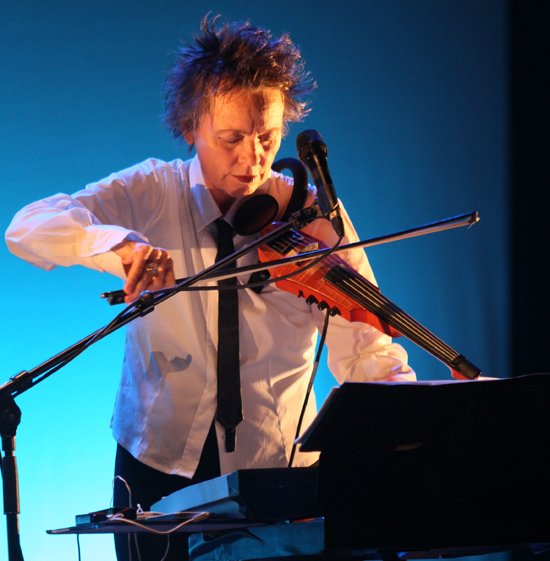
Laurie Anderson
Cyclobe, Myrninerest & films by Derek Jarman
Queen Elizabeth Hall, 4th August
This perfectly formed night sees Antony’s curatorial focus on expressive song taken to the limits with David Tibet’s new project, Myrninerest, before being abandoned (almost) entirely with Cyclobe’s soaring, sensual instrumentals. Billed as ‘ALBION – HYPNAGOGUE – GHOST, Hallucinatory Queer British Paganism’, the evening incorporates rare screenings of British visionary director Derek Jarman’s experimental Super-8 films, to firmly root the proceedings in a very British network of artists whose forceful performances seem to be reaching beyond their audiences to higher powers.
The first half of the evening is devoted to Jhonn Balance, the wild but much-loved member of this extended esoteric family, whose death in 2004 closed the book on the genuinely magickal music of Coil. Opening with Balance’s favourite Jarman film, Journey to Avebury, a study of the Wiltshire countryside and its mysterious monoliths, the evening’s subsequent events are imbued with its peaceful, pastoral atmosphere.
Myrninerest (named after the signature used by Madge Gill, a mediumistic artist) then take to the stage for the premiere performance of their debut album, "Jhonn," Uttered Babylon, written by Tibet under the influence of visitations from Balance, and composed and recorded by James Blackshaw. Like Tibet’s main band, Current 93, Myrninerest channels eerie English folk motifs into the same idiosyncratic musical vernacular that renders all of his music instantly recognisable, regardless of the recruits he’s working with. Expanded from the album’s bare acoustic guitar and harmonium to add violin and subtle electronic embellishments, tonight’s music is truly beguiling. However, it is Tibet’s voice that delivers the greatest impact. For 45 minutes, with montages of Balance growing from child to adult filling the screen, Tibet takes the audience through the five stages of grief in a performance that sees his singular style – somehow simultaneously sung and spoken – form an intense and harrowing barrage of emotions (despite the incomprehensibility of his surreal lyrics) leaving the audience dumbstruck in its wake.
A solemn interval is followed by three illusory Jarman shorts that recalibrate our minds for Cyclobe – their UK debut, even though the band has been around for well over a decade. But it was truly worth the wait. Strongly contrasting with Myrninerest’s more linguistic approach, Cyclobe use sound as a sensory force that goes beyond language to stir something primitive, ancient and dangerous. They enter a stage littered with rare handmade instruments, from an array of gongs to various bagpipes and hurdy-gurdys, that combine with a laptop and analog synths to forge perhaps the most potent performance the Southbank has seen since Coil played there in 2002 (Cyclobe’s core of Ossian Brown and Stephen Thrower both being ex-members of that band).
And it’s these audacious instrument choices that illuminate their epic mantras to confidently seduce listeners into expecting a visitation from beyond the realm. And, after a mid-set recorder quartet, a visitor was indeed summoned, in the form of Antony, whose sweet tones wove in and out of writhing electronics and folksy wails to form a celestial lullaby. They closed their set with the title track from their latest album, Wounded Galaxies Tap at the Window, but this time these stellar systems, brimming with dark matter, were not just tapping the window but smashing the glass and parading monstrously around the auditorium, before disappearing once more, leaving their intermediaries to take a well-earned bow. RC
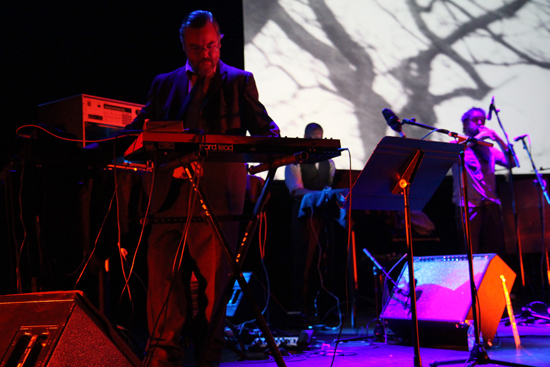
Cyclobe
Antony and the Ohnos: Yoshito Ohno, Antony and the Johnsons, Johanna Constantine, William Basinski, and Mr. O’s Book of The Dead (dir. Chiaki Nagano)
Queen Elizabeth Hall, 5th August
At the age of sixteen, Antony got a poster of Kazuo Ohno, the pioneering Japanese Butoh dancer to whom this evening is dedicated. Initially attracted by this "beautiful creature, dressed in Victorian women’s apparel and wearing heavy makeup, reaching towards the stars", he placed it above his bed, where it apparently remains to this day. Since then Ohno became a great inspiration to Antony, culminating in his striking image appearing on the cover of the 2009 album, The Crying Light (released just months before Ohno passed away at the age of 103). As a result of this iconic sleeve, Antony was invited to Tokyo to collaborate with the Kazuo Ohno Studio led by Ohno’s son, Yoshito, the mesmeric results of which have since been repeated in New York and now London.
This cross-cultural cabaret begins, though, in New York. From behind the gauze curtain obscuring the entire stage William Basinski sits at a laptop and fires up one of his exquisitely crumbling Disintegration Loops as equally grainy film of the night’s sky replete with full moon is projected across the stage. Purposefully, yet with leaden movements, Johanna Constantine (Antony’s creative partner since they were 17) strides in front of the film looking like a severely distressed bride. Under her slip of a veil she is naked save for shiny metal underwear, her body bearing bloody and skeletal make-up to describe a wounded mutant of the apocalypse. Rather than unfold some kind of narrative, her slow anguished movements combine with Basinski’s decayed symphony, creating an unnerving sense of gloom.
In contrast, Antony’s performance is one of wonder and delight. Sat behind a grand piano and backed by just three Johnsons on cello, violin and acoustic guitar, he begins with ‘Her Eyes Are Underneath the Ground’, as an elderly man wearing just white trousers and covered in white make-up tentatively tip-toes around the stage holding a tall red flower. Like Constantine’s dance before, Yoshito Ohno’s highly-measured minimal movements are abstract, aimed at creating an impression or atmosphere closer to performance art than the more typical preconceptions of what dance should be.
While Antony serenely works his way through a set of songs taken mostly from The Crying Light, accompanied by sparing orchestrations that serve to highlight his singular voice, Yoshito episodically exits and enters the stage, each time with a modified but always extraordinary appearance. The septuagenarian goes on to don a Muppet-like horse head, a lady’s bonnet and, later, a feather tiara, but ends dressed smartly in plain black, the alienating white make-up all gone, performing with a small hand-puppet of his father as Antony croons Elvis’ ‘Can’t Help Falling in Love’. It’s a strange and unpredictable combination of sparkling pop balladry and absurd dance poetics whose resolution forms a tender, respectful and highly memorable communion. RC
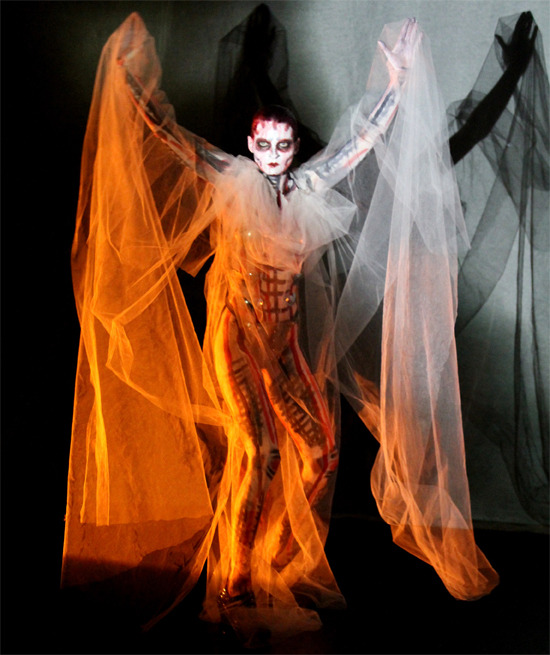
Johanna Constantine
Matmos
Queen Elizabeth Hall, 6th August
Every time I watch Matmos, I’m amazed by the care and lightness with which they handle their source material. Given the thematic and textural density of much of their work – they pack together concepts as tightly as they do sounds, and have made records by sampling almost everything imaginable (including the slicing and dicing sounds of surgery) – it’s never presented in a po-faced way. In fact, quite the opposite: M.C. Schmidt and Drew Daniel instinctively recognise that there can be no true seriousness without humour. By practicing extremes of both – often within the space of a single track – they come across as neither preachy nor overly goofy.
Tonight’s performance, as ever, finds them pitched neatly somewhere between those two poles. Schmidt opens the performance sat at a desk, straight-faced, delivering a long monologue expounding the benefits of a practice called D.E, or "Do Easy", and how it enables the disciplined student to clean their living space in a matter of seconds. He ends it bent over Daniel’s knee, naked backside to the crowd, Daniel’s spanks adding extra percussive and visual force to a sort of symphony for slapped arses, accompanied by a hypnotic film. At one point in between his face appears massive onscreen, pulling comedic faces to accompany an array of squawks, chirps and glitches generated by Daniel’s equipment.
One mid-set track is a celebration of Alan Turing. Focusing on the groundbreaking positives to his life and work, Schmidt and Daniel whip up a dry, percussive piece for typewriter, articulated in a language of clicks, taps and zippy glissandi. Behind them, visuals spell out Turing’s famed test to detect artificial intelligence, translating the words from Enigma code into English, and back again.
These interlocked themes of sexuality, technology and science have been revisited throughout Matmos’ recording career, and they’re cornerstones of this evening’s performance. Tonight their core duo is bolstered to a quartet by the addition of guitarist and drummer, which heralds a subtle shift in sound. They’ve signed to Thrill Jockey for an upcoming full-length, which makes sense given the spaced-out, near-prog rock-ish feel of a couple of new tracks tonight – the opener is almost raga-esque, a drawn-out drone for guitar and electronics, accompanied by whirling keyboard figures from Schmidt that repeatedly whip up and down the register. Again, though, it takes a group like Matmos to pull off such serious music with such a sense of fun. Appetites suitably whetted for new material, and hopefully further performances on our shores in the near future. RG
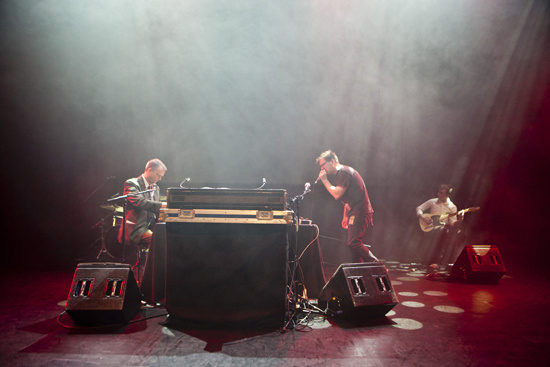
Matmos
Elizabeth Fraser
Royal Festival Hall, 7th August
50 Words For Snow was a deeply disappointing Kate Bush album, but many people wrongly said it was fantastic because they rightly love Kate Bush. I’m reminded of that tonight. The atmosphere at Elizabeth Fraser’s first ever solo shows is hushed and reverential, bar the two or three sad sacks who find it hilarious to shout out "I love you Liz!" or "Marry me!" between songs. Afterwards, everyone is buzzing about how transcendental and sublime the evening’s music was. It was pleasant, a comeback work in progress, but the wishful stampede to hail her every note as the nectar of the gods does nobody any favours.
Since the demise of the Cocteau Twins in ’97, Fraser has largely lain low, emerging only to lend contributions to Massive Attack and for a couple of low-profile singles. The Cocteaus’ music seems not just from another era but from another galaxy now: in an age when the flatulent foghorn-ing of Florence Welch is portrayed and perceived as the arty antidote to club-pop, their keening swoops would surely see them pushed to the margins rather than embraced as music-press darlings. Coaxed to play live at Meltdown by Antony Hegarty, Fraser has in her service a decent, functional band, among them former Spiritualized keyboardist Thighpaulsandra, his look disconcertingly drawn from repeated viewings of Flash Gordon. The singer herself has come dressed as a Christmas cracker. The musicians are solid but tentative: everyone, including Fraser, is too quiet. The music cannot envelop us at this level; we cannot drown in it, we cannot swoon.
That said, it is sweet, elegant. The set is a mix of old Cocteaus songs re-drawn as tidy, conventional ballads (‘Donimo’, ‘Pearly-Dewdrops’ Drops’), and quite strong new material, which bleeds between trip-hop and Enya, but is better than that sounds. Two backing singers take up the slack that used to be full of multiple sparkles but is now proficient. For one song, the band leave the stage and ex-Genesis guitarist Steve Hackett guests, playing neo-flamenco on acoustic guitar, sidelong to her still-enigmatic utterances.
It’s a tipping point: this music is very, very prog, which is high praise from me. Most will deny that, but the slow-burn intros, occasional bursts of wilful crackle, and studiedly impactful entrance of drums all add to the striving for drama, serenity and pomp, and for grandeur (which isn’t quite there tonight, but may arrive the more this group plays). Perhaps heyday 4AD (at least before Pixies and Throwing Muses came along) was prog for people scared to admit they like prog. Heck, I’ve babbled worse theories.
Fitting then that the encore of ‘Song To The Siren’ (Tim Buckley’s elegy as re-imagined by Fraser’s vocal for This Mortal Coil) ends tonight on an almost-epic high, even if it is, like most of the concert, relatively understated. Despite the subdued nature of the show, the audience – as they say – erupts, and bouquets are brought forth. Not a lot was done wrong here. It’s a competent and tasteful first step on the road to return for one of the great voices of another time. But let’s not pretend it was fabulous just because we wanted it to be. It’s more appropriate to give her the considered artistic respect she deserves than to blow smoke up her dress and make out it was an all-conquering, tear-inducing triumph. That may yet come. Save some gas. CR
Marc Almond Presents Marc & The Mambas’ Torment & Toreros
Royal Festival Hall, 9th August
Antony is onto something when it comes to Torment & Toreros.
The fact that Meltdown’s curator takes the stage himself before the performance to deliver a heartfelt introduction, before returning to join Almond in showstopping duets on ‘My Little Book of Sorrows’ and a cover of ‘Caroline Says’ speaks volumes for the importance Torment & Toreros had (and still has) for Antony Hegarty, and the esteem in which he holds the diminutive singer. Indeed, if this occasionally uneven presentation of the entire second Marc & The Mambas album proves anything, it’s that there is so much more to Marc Almond than his pop hits with Soft Cell and, as he has said himself, his sexuality.
Listening to Torment & Toreros today, it’s clear that it must have baffled, and probably annoyed, quite a few people upon its release back in 1983. It overreaches massively, combining more styles than should have been deemed feasible, and it’s brutally honest, a stark reflection of the emotions and thoughts Almond was going through as fame swept him up and the backlash from critics and gay-hating commentariat bit hard. But this insane ambition and naked vulnerability are also its strengths, and with the weight of 30 years of musical changes behind it (including Antony Hegarty’s celebrity, of course), it now stands up pretty well.
A festival outing overseen by one of Almond’s biggest fans is a perfect forum to reiterate Torment & Toreros‘ flawed brilliance, although the initial moments do not bode well at all. Almond has clearly not spent much time with this material since the eighties, and is forced to read from a lyric sheet throughout a weighty, turgid rendition of ‘Boss Cat’. This proves a recurring theme during the entire set, although to a lesser degree as he grows in confidence. Later, though, moody, soul-bearing ballad ‘In My Room’, delivered over a graceful piano melody, is a dramatic delight, and as he hits the extended high notes, people around me are moved to tears. In fact, from the otherwise muddled Jacques Brel cover ‘The Bulls’ (I love Brel as much as the next guy, but I really don’t see what British/American singers hope to get from covering him – apart from Scott Walker – as it always ends up sounding like camp vaudeville) to the gothic pop of ‘Black Heart’ and a sparse, moody, cover of ‘Gloomy Sunday’, Almond truly shines as a singer, capable of switching registers and encapsulating the emotions that drip through these songs.
Musically, Torment & Toreros is so eclectic, there are bound to be poor moments, particularly when the poor sound mushes everything together to the point that all you can hear are Almond’s plosive ts and ps hitting the mic. The set-up, though, is impressive, with a talented string section, choir, two guitars and, above all, a potent blend of classical percussion and rock drum kit. Once the sound evens up later in the performance, the drums take their deserved prominence, especially when the band are joined by Jim Thirwell, aka Foetus, who flew over from New York especially to conduct and bang two snares on ‘A Million Manias’, a rambunctious mix of African polyrhythms and dark industrial pop.
Antony is definitely onto something with Torment & Toreros and, especially, with Marc Almond himself. He’s not perfect, and airs his imperfections so brazenly that some will always be put off. The album is too long, too overblown and inconsistent. But it also contains some glorious tunes and overflows with the spirit of one man, one unique man. In that respect, it’s a classic, and incomparable. That it was also so inspirational to Antony Hegarty that it led him into our lives is a bonus and, like this evening, one worth savouring, despite the occasional flaws. Who’d want perfection when imperfection can be this fascinating? JB
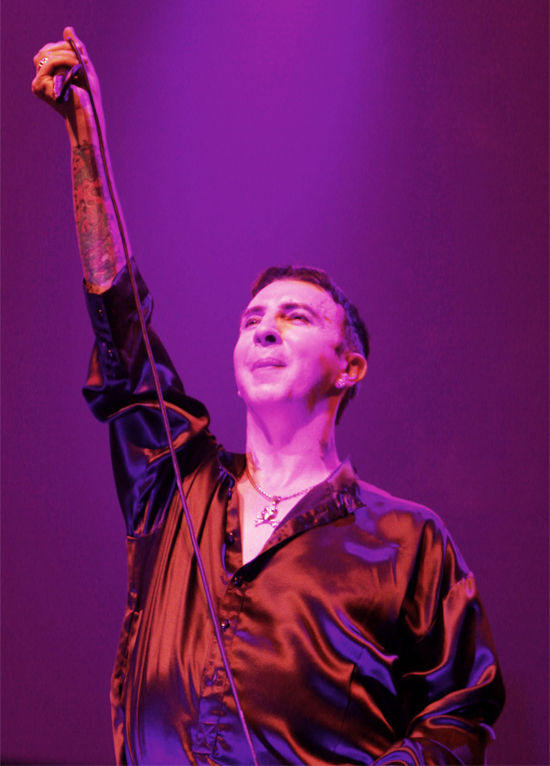
Marc Almond
Lou Reed: From The VU to Lulu
Royal Festival Hall, 10th August
Last time this journo saw Lou Reed at the Royal Festival Hall, it was two years ago as part of his Metal Machine Trio outfit, where he unleashed a roaring noise set showcasing his own bloody-minded approach to improvisation as well as the bludgeoning talents of sax mauler Ulrich Krieger and Sarth Calhoun on fingerboard continuum. By contrast, this Meltdown show subheading reads ‘From the VU to Lulu‘. Still, if there’s any artist who seems ill-suited to a ‘Greatest Hits’ package, it’s Reed. I like him when he’s being contrarian, uncompromising and experimental, so end up approaching this show with far more reservation than that previous one. That trepidation sadly proves to be well-founded.
I should state at this point, mind, that the man himself sounds as near enough to great as a 70-year-old ex-junkie can. His voice is stronger than ever and, bar the fact that he doesn’t do much onstage, he looks fit, fierce and every bit the curmudgeonly rocker of old. And, unlike many, I rather enjoyed Lulu (despite thinking that Metallica were mostly shit on it), so greet the opening bars of ‘Brandenburg Gate’ with a rush of enthusiasm, even as the opening line "I would cut my legs and tits off / When I think of Boris Karloff" produces a bout of bizarre and giddy laughter from the crowd. The band assembled for this tour actually seem to master the Lulu material better than Metallica and, live, the heavy metal riffs and brutish force of that album gain proper force, rather than the occasionally lumpen dirge of the record.
Thank the Almighty for ‘Heroin’. There’s a sentence I never thought I’d write (he says). What will probably go down as Reed’s greatest ever song arrives next, and, despite the fact that the arrangement, all noisy guitar and pummeling drums, effectively neuters its potent vulnerability, it at least gives Krieger a chance to shine, which he seizes by unleashing some devastating sax onslaughts, thrashing around like a kid at the front row of a 1977 Sex Pistols gig.
Bar the Metal Machiners, though, Reed’s band is so clean, so professional, that the evening ends up a strangely sedate affair. ‘Walk On The Wild Side’, for example, is beyond parody: a superb, legendary, pop song transformed into a sickening pop-funk farce with the kind of uber-clean guitar sound you’d hear on a mid-eighties Sting or Billy Joel record, right before you reached for the sick bag. As such, the lesser-known tracks are most engaging: a grinding Sabbath-esque take on ‘The View’; the ever-beautiful ‘Sad Song’ – though even then they try to fuck it up with some cliched solos and over-the-top vocals.
Of course, I can already hear the cries of the baying mob: who am I to say how the incomparable Lou Reed performs his own songs? Still, this Capital Radio take on some of the greatest rock songs of the last 40 years is more often than not sloppy, uninspired, and (whisper it) dull. Reed, even as of two years ago, is none of those things, and if the worn out grooves on my records are anything to go by, neither are these songs. JB

Lou Reed
The Voluptuous Horror of Karen Black / Tenderloin
Queen Elizabeth Hall, 10th August
For perhaps the most implicit rendering of the Future Feminism trope weaving its way through much of Antony’s Meltdown, this evening confusingly feels like entering an early John Waters movie. In a double bill that reprises the closing night of the recent Camp/Anti-Camp festival in Berlin, we get characters like Vaginal Davis, the genderqueer performance artist who adopts the persona of "Dagmar Hofpfisterei, daughter of Christiane F." to front her new band, Tenderloin.
Then later, the girls of Karen Black march stoically around the venue despite wearing little else bar thigh-high boots and fright wigs, their exposed bodies each painted with individual, garish colours to look like the unlikely spawn of a three-way between Divine, Amy Winehouse and one of the Teletubbies. Oh, and there’s music too, but with such transgressive choreographies on display it feels somewhat secondary, providing a backdrop on which to project brash, bold, bad and bemusing B-movie manoeuvres.
Tenderloin’s sound, a kind of smooth but trashy surf-punk meets disco-funk, seems to emanate in the main from drummer, Joel Gibb (of Canadian high-energy popsters Hidden Cameras), who somehow manages to sing, strum guitar and keep the beat simultaneously. But the focus is all on Davis, her imposingly tall, muscle-bound figure barely contained in a slip of a white dress as she semi-sings deranged quips like "the guy who spits on your cheeseburger is dating my mother". Such confessions see Davis increasingly adopt the screechy tones of a spoilt teen pageant queen, becoming more impetuous as the set progresses, before spinning and falling to cheekily reveal a smooth behind.
With smiles now firmly spread across everyone’s faces, the six girls of Karen Black march down the aisles in a perverse parade of comicbook colours, serpentine false eyelashes, bowed beehives and nudity. As the small but glamorous frame of Kembra Pfahler, the mastermind behind The Voluptuous Horror of Karen Black, takes centre stage, the traditional sounds of sleazy garage rock are revved up by her band. Pfahler authoritatively deals out directions to the other girls as they methodically work their way through a toyroom-full of self-made props and scenery (that are mostly given away to audience members before the evening’s through).
Any initial feelings of titillation are rapidly sequestered by the phantasmagoric proceedings – a kind of kaleidoscopic carnival of psychedelic excess. Spiralling umbrellas are hastily replaced by striped flags, an underwear drawer placed centre stage is emptied – pants flying into the audience, followed by Pfahler’s legendary party trick of having ink-filled eggs cracked on her vulva as she does a prolonged head stand, legs akimbo. After which she proudly proclaims "I just turned 51!", while ditching her problematic wig and asking the audience for her pants back so she’s not dripping paint across the stage for the rest of the fried floor show. I doubt Lou Reed’s performance, which is happening simultaneously across the road, is quite as colourful, cheerful or controversial. RC
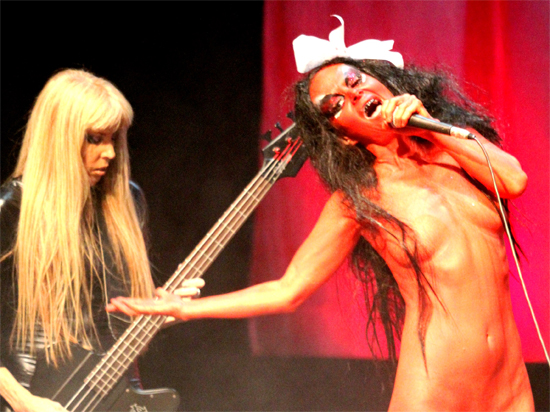
The Voluptuous Horror of Karen Black
Kembra Pfahler
Purcell Room, 11th August
Whether the previous night’s Karen Black gig was merely a dream provoked by ingesting a particularly strong piece of cheese before bed, or a real exercise in contrarian cabaret, one wonders: what did it all mean? Handily, Kembra Pfahler returns to the Southbank for a solo, spoken word show to reveal a feminist foundation to her art. Humbly introducing herself as a reluctant, nervous speaker, the evening couldn’t contrast more with last night’s audaciously rude riot as, with just a hint of self-deprecating humour, she seriously sets out her stall.
She positions her work as a combination of ‘Availabism’, her term for punk’s DIY legacy that makes the "best use of what’s available", and ‘Future Feminism’, an embryonic group that seeks to fix our broken society by rejecting its inherited patriarchy in favour of a more caring, feminine governance. Viewed in this way last night’s nudity becomes a serious, polemical act, as Pfahler put it: "to perpetuate a different paradigm of visualising the naked female form." Her other actions are more explicit, like when she sewed her vagina shut for Playboy or made a ‘Wall of Vagina’ by stacking the girls of Karen Black on top of each other to pour yoghurt between their legs.
This "complete gross-out", as she puts it, "is to poke fun at extreme objectification". Apologising for seeming a bit ‘vanilla’ at one stage, her unstructured delivery is consistent with her refreshing, anti-audition attitude ("I’ve never solicited myself as an artist"), preferring improvised, natural discourse to slick, rehearsed persuasion. The result: a charming, passionate and inclusive discussion that encourages the audience (including her bandmates and an outspoken Antony) to correspond and help write the Future Feminist manifesto together.
With such variety and depth, delivered by an array of uncompromising and distinct artists, one begins to wish Antony would curate all year round – the world just might be a better place for it. RC
London Contemporary Orchestra performs William Basinski’s The Disintegration Loops
Queen Elizabeth Hall, 12th August
The Disintegration Loops are an intriguing choice of finale for a Meltdown so focused on the voice. Then again, an occasional, ineffable vocal quality – a hint of plainsong – is just one outcome of the accidental alchemy that produced these pieces.
As you may already know, when William Basinski set out to grant his early instrumental compositions eternal digital life, he got both less and more than he bargained for. The aging tapes disintegrated as he transferred them to CDR, and his bold and beautiful loops took on extraordinarily rich, complex new tones. The pastoral originals were placed, via detailed distortions and drop-outs, somewhere between Fripp & Eno’s sumptuous sci-fi soundscapes and the stop-motion dissociation of Alvin Lucier’s <a href http://www.youtube.com/watch?v=sCgicEWD1Nc" target=”_out”>I Am Sitting In A Room. Something about these sounds-that-aren’t-themselves sets up an intimate pull and distancing push familiar from Fennesz’s waterways, Burial’s overheard angels, My Bloody Valentine’s moans and roars.
Almost a decade after their emergence, I still find new emotional and conceptual resonances with each turn of the loop. The <a href=”http://www.youtube.com/watch?v=qYOr8TlnqsY”>9/11 story is in there: the sound of catastrophe travelling across water, of smoke obscuring the event, of time passing and trauma repeating until placed and accepted. So are more universal phenomena: consciousness distorting outside stimuli into poetry, music, beauty; the body’s inexorable decay, and the liberating sense of transience it can bring; distance from a youthful starting point you can no longer quite make out. Cultural transitions too: the move from analogue to digital, valued objects to immaterial infinity; from cultural production in 80s NY lofts to an untenable city drowning in finance; ambitious minimalist compositions and buildings dissolving into the past.
How on earth were the London Contemporary Orchestra going to represent these mirages produced by iron oxide dust falling from plastic? Would they use wind instruments with chocolate bells that would melt in the August heat? Dose the musicians with downers of varying strengths, so they’d become steadily less coherent and motivated as the performance progressed? Dismantle the concert hall’s acoustic fixtures as the band played on, so the sound dampened and deadened?
What we actually get is in some ways stranger still: a symphony orchestra interpreting a deteriorating tape of a symphony orchestra, with great precision. A 30-minute ‘2.1’ is fascinating to behold, but doesn’t quite take on a life of its own. The original is dominated by a repeating, softened foghorn-like blast, represented here mainly by a descending run on violins and two-note double bass motif. The subtle variations do provide a lucid dream-like sense of controlled vertigo in places, but – despite the nice touch of a percussionist rustling cling-film to introduce interference – the unfathomable detail of the original just can’t be translated through identified playing objects.
However, the churning orchestral loop and content synth curlicue of ‘1.1’ – played principally on trombone/bassoon and xylophone here – come through loud and clear. We get the full hour, and it’s every bit as moving, if not quite as otherworldly, as the original. The tension between the unrelenting force of the main loop and the floating prettiness of the synth/xylophone line gives the piece its appealing voice, benevolent and malevolent in varying measures; its dissolution can feel heartbreaking. 15 minutes in, the very peak of the loop begins to disappear. 20 minutes in, the drums give it an ominous lean. The second half is a steady fade, two double basses maintaining the quiet momentum to the end. It’s pretty astonishing. During the final, five-minute silence held by the conductor, my mind goes to involuntary work recapping and distorting what we’ve just heard. By the time we step out into the night, I remember something that sounded like voices. LA
Photos by Mark Mawston, except Matmos, which is by Tim Boddy

